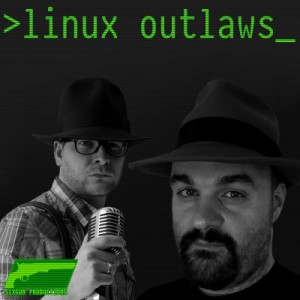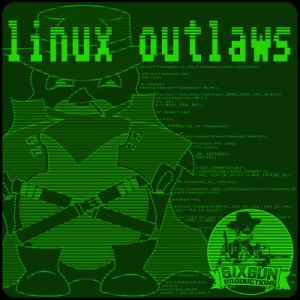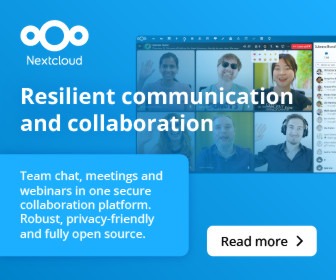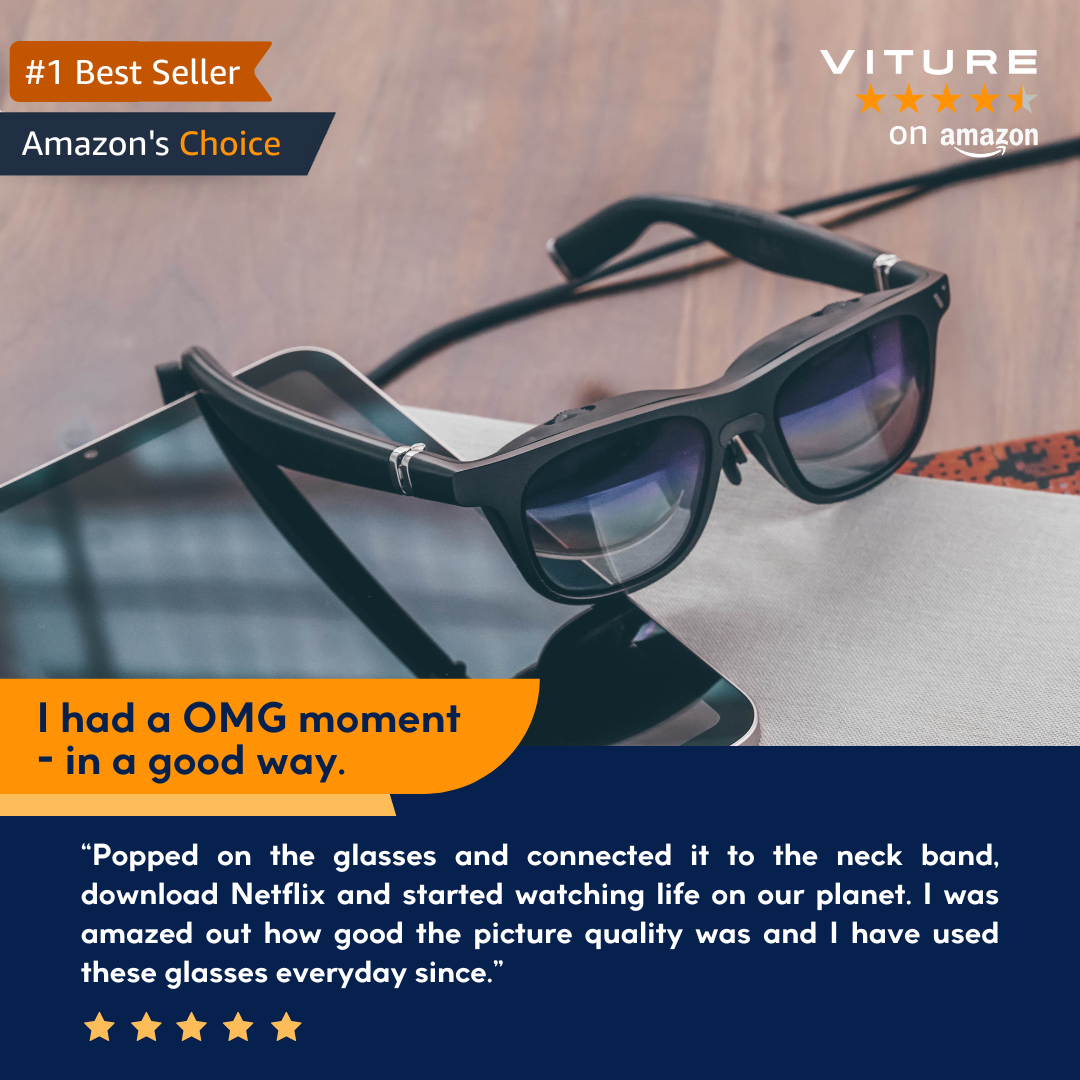The introduction was inconspicuous enough. Philip Newborough, the lead developer for CrunchBang, tweeted to me: “They’re talking about you on LO.”
“LO?”
A few questions and a search or two later, I was at a Google Hangout where Dan Lynch, an English musician in the band 20lb Sounds from Liverpool, and Fabian Scherschel, a German tech journalist and rabid Pittsburgh Penguins fan, were discussing the FOSS issues of the day; Lynch with his subtle and deadpan delivery serving as an anchor and foil for Scherschel’s occasional — and hilarious — flights-of-ranting-fancy.

Photo by Fabian Scherchel – http://sixgun.org/
Linux Outlaws is not for shrinking violets — it is portrayed on its site as “very much like listening to two friends sitting in a pub, having fun and talking about things they find interesting.” However, I think that sells the show short — it is far more entertaining than that (and when they say, “Not recommended for the faint of heart or the ignorant,” they mean it). Always straightforward and honest, always informative and humorous, Linux Outlaws never met an issue they couldn’t tackle with their unique brand of wisdom, insight and jocularity.
Now, Lynch and Scherschel — Dan and Fab to their relatives, friends, and a wide listener base — are at the crossroads. Recently, with the episodes well into the 360s in number, they decided to finish out the year with Linux Outlaws and ride off into the sunset.
I was able to catch up with them and ask where they’ve been, where they’re going, and other items of interest.
Q: From what I understand – and correct me if I’m wrong – Sixgun Productions and Linux Outlaws seem to have grown up together, like twin brothers. Can you take us through how you two decided to work together on this project, the founding of both Sixgun and Linux Outlaws, and how both have grown over the past seven years?
Dan Lynch: Fab and I met online in early 2007. It was via a now defunct Finnish social network called Jaiku. I started podcasting with a group of friends I met on there around April 2007. Fab and I were both into Linux and would often talk about Open Source software and technology. One day he approached me and asked if I’d like to do a podcast with him about this subject. The name Linux Outlaws was coined from somewhere (probably Fab) and then the show began in Sept 2007. At the time there was no Sixgun Productions, it’s was just Linux Outlaws. Sixgun came later as we wanted to expand into more of a network with various different shows under one banner. There are other shows on the network now such as Angels Of Death and Steel Rain, but we haven’t had time to expand that as much as we’d like. We’ve had good ideas and some shows have come and gone but it’s always been time that’s the issue. Life can be busy and finding the time to do more is tough. Sixgun Productions will continue of course and probably gain other new shows long after LO ends. I hope so.
Fabian Scherschel: Dan has explained this very well. The only thing I would add is that the idea of Sixgun Productions originally came from me when I wanted to branch out and do other shows that have nothing to do with Linux or open source. I was also conscious of the fact that LO would some day come to an end and that I still might want to do other podcasts beyond that. Sixgun was my idea of tying all those shows (and possibly other hosts involved in them) together under a single banner.
Q: As long as I’ve been listening to Linux Outlaws — and watching the live recording on Google Hangout — you guys have been doing the show from different locations, sometimes as far apart as Dan in England and Fab in Germany. What amazes me is how seamless the live recording seems while watching on Google. Was it always this way, and if not, what kind of hurdles or glitches did you have to overcome?
 Dan: We’ve always worked together online from a distance. In fact the number of shows we’ve done in the same room is still pretty low. We did the show together for a year before even meeting in person which seems crazy now looking back. It’s evolved over time really. We’ve always recorded the show in one go, not stopping between segments. In the early days we just recorded together on Skype and it wasn’t broadcast live at all. We found it pretty easy to just chat without stopping though and I suppose that’s the joy of finding other people you can work with easily. It wasn’t a big effort. Later on when we got an Icecast server to broadcast the audio and then eventually Google Hangouts and live video streaming came along we were already well practised at it. We were able to just jump into doing stuff live without too much trouble. That may sound arrogant, but I think we’re both relaxed about things and have no trouble talking. That’s not to say we’re amazingly slick or professional broadcasters. The key is that we never intended to be overly slick, we wanted the show to be natural. If it has the occasional mistake then it makes it more human I think. In terms of technical issues working remotely on a show like this I’d say the delay can sometimes be a factor. Also sometimes the audio will cut out or break up on one end as we’re doing the show and the other host misses part of a sentence. I’m amazed how well it’s worked with Skype and Hangouts though. I don’t have a fantastic broadband connection at all but it still manages to hold up.
Dan: We’ve always worked together online from a distance. In fact the number of shows we’ve done in the same room is still pretty low. We did the show together for a year before even meeting in person which seems crazy now looking back. It’s evolved over time really. We’ve always recorded the show in one go, not stopping between segments. In the early days we just recorded together on Skype and it wasn’t broadcast live at all. We found it pretty easy to just chat without stopping though and I suppose that’s the joy of finding other people you can work with easily. It wasn’t a big effort. Later on when we got an Icecast server to broadcast the audio and then eventually Google Hangouts and live video streaming came along we were already well practised at it. We were able to just jump into doing stuff live without too much trouble. That may sound arrogant, but I think we’re both relaxed about things and have no trouble talking. That’s not to say we’re amazingly slick or professional broadcasters. The key is that we never intended to be overly slick, we wanted the show to be natural. If it has the occasional mistake then it makes it more human I think. In terms of technical issues working remotely on a show like this I’d say the delay can sometimes be a factor. Also sometimes the audio will cut out or break up on one end as we’re doing the show and the other host misses part of a sentence. I’m amazed how well it’s worked with Skype and Hangouts though. I don’t have a fantastic broadband connection at all but it still manages to hold up.
Fab: I’ve never thought of it that way, but I guess Dan is right: It’s the combination of trying as hard as possible to make it perfect while still having fun and always admitting that, despite trying, it will never be perfect. The little mistakes add flavour. We used to edit a lot more in the beginning, but we both became better at speaking and at some point we just accepted all the little mistakes that still happen beyond that as spice in the recipe, I guess. One thing we just naturally acquired a knack for is to know when the other will probably reply and how he will react to what I’m saying. That happened really fast and makes the whole thing almost effortless. I think we were lucky to run across each other and start the show. The last few years we just had fun while we recorded, there’s no real stressful part there at all I think. Unless the tech broke — which always happens sooner or later when you do a regular show.
Q: To take the previous question a step further, what would you suggest as a course of action — or what words of wisdom do you have — for those who want to start a FOSS podcast? After all, you’re leaving a huge void in the FOSS podcast realm.
Dan: That’s very kind of you to say but I don’t think we’re really leaving that big a gap. Lots of other shows have come along since we started and I like to think us making way will give more people inspiration to start a show too. There’s no great secret or magic to what we do. Obviously there are some basic things you learn as you go along and there’s always things you can improve. My advice would be to think a little bit about what you want to talk about before recording, have a few notes to guide you so you don’t run dry. It doesn’t have to be extensive but a list of topics is a good start. Get yourself a decent microphone and recorder (or computer), find a space without any background noise and go for it. You only learn this stuff by doing it really and the joy of podcasting is that absolutely anyone can try. What have you got to lose? We had no grand plan or ambition when we started. I was amazed, and I do mean amazed, when we got up to 100 listeners for our show. We were just two guys chatting and having fun, not knowing if anyone would ever really listen. I think that’s important, do it because you want to. Do it for fun. Don’t do it thinking you’re gonna be famous or rich, you’ll only be disappointed if that’s your motivation. It comes across to the audience as well. If you’re genuinely interested in something and passionate about it that shows. You can’t fake it.
Fab: One thing to remember is that the most important part of podcasting is that it isn’t broadcasting in the traditional sense. You have no boss, you’re your own producer and there’s no regulatory body to police or censor you. You can swear and tell things exactly as you see them. I always saw that as the mission of LO: To be unashamedly biased and, above everything else, authentic. If the F/OSS podcasting scene would lose that, I’d be sad. In today’s politically correct, PR-laden world we need more independent people who say things as they see it. As Dan says, podcasting isn’t terribly hard, so go for it! To quote John Locke from “Lost”: “Don’t let anybody tell you what you can’t do.”
Q: There are about 360-something Linux Outlaws shows going into the end of this year and your wrap-up. Are there any special shows of note, or shows that were special to either or both you?
Dan: Hmm, that’s a tough one. I’m tempted to say every show is special in it’s own way but that would be a total cop out. I really enjoyed doing a live show on stage in Liverpool for episode 300. I also enjoyed doing a show from a car speeding down the Autobahn for episode 100. We’ve had loads of great guests who’ve enhanced the show endlessly too. That’s always fun. Doing this podcast has enabled me to do things like meet Linus Torvalds himself in the USA, obviously that was special for me but he wasn’t on the show. He doesn’t like doing interviews much which I can understand. It was great to talk to him for a few minutes though.
Fab: Yeah, 100 and 200 were memorable milestones and a lot of fun. We also once interviewed Carl Manneh from Mojang; that was cool. This was before they became evil Microsoftians and people hardly knew Minecraft. The first time we hit the stage in front of a live audience at OggCamp was pretty thrilling too.
Q: I know you’re a musician, Dan, and Fab, you’re a well-respected tech journalist in Europe. Looking ahead, what do your post-Linux Outlaws days have in store for you?
Dan: Well we’re not giving up podcasting completely, either of us. I already do a fortnightly music show called Rathole Radio. That will continue. I also occasionally host FLOSS Weekly on the TWIT network. I’d like to have more time to spend on music for sure. When LO started in 2007 I wasn’t in a band and since forming 20lb Sounds in 2010 obviously that’s changed. I’d like to finally have time to sort out my music studio and do more there. I’d like to get back into programming more regularly and learn how to do this properly again. We also plan to start an new show late in 2015 under the Sixgun Productions banner. We don’t know exactly what that will be yet but something less news focussed and more general chat. So we can talk about films, music, games, comic books (which I love) and many other things too. We’ll make sure to shout about it if and when it happens.
Fab: They won’t keep me from podcasting. As Dan says, I’m already planning the next show for Sixgun Productions. I just want to take a break, refocus and get my mojo back, so to say. As for being a tech journalist, I’m definitely that now. Not sure about well-respected, but I do work for the IT magazine with the most subscribers in Europe now. Something that only happened because of LO. It wasn’t a straightforward march to the top, as long time listeners of the show will be aware, but I made it to my long time dream job eventually. I am very thankful to the podcast, Dan and all our listeners over the years for that.
Q: As I mentioned to both of you personally, I have completely enjoyed Linux Outlaws on a weekly basis, and look forward to your endeavors going forward. Any final words as Linux Outlaws hosts to your fans?
Dan: Thanks, that’s really nice to hear. I’ve been amazed that so many people still care about this show and the messages we’ve received have been really touching. I’d just like to say thanks to everyone who listened, everyone who sent an email, joined the IRC or came and said hello at a conference or event. It’s been an amazing seven-year ride and I wouldn’t change any of it for the world. There comes a day though for the old timers to stand aside and let someone new really take things forward again. I guess my message to listeners would be, you’ve seen how easy this is if two idiots like us can do it, so why not have a go yourselves. To the community, thanks for everything and stay in touch,
we’ll both still be around and we’ll always be Linux Outlaws!
Fab: Thanks for having me in your ears all of those years. I’ve been drunk, I’ve said stupid things and I’ve been excited about all kinds of random crap. If you could stand that and engage with a show that had a different opinion from yourself for probably a lot of the time, then you’re a good person. It takes some major backbone to listen to strong opinions, think about them and then engage in an intelligent discussion. And I am still amazed the majority of our listeners did exactly that over the years. The show might end, but as Dan says, you’re all still Linux Outlaws. It’s like the Browncoats from “Firefly”: They might have lost the war, but they’re still Browncoats. And they’re still flying.










Thanks for doing this interview, Larry.